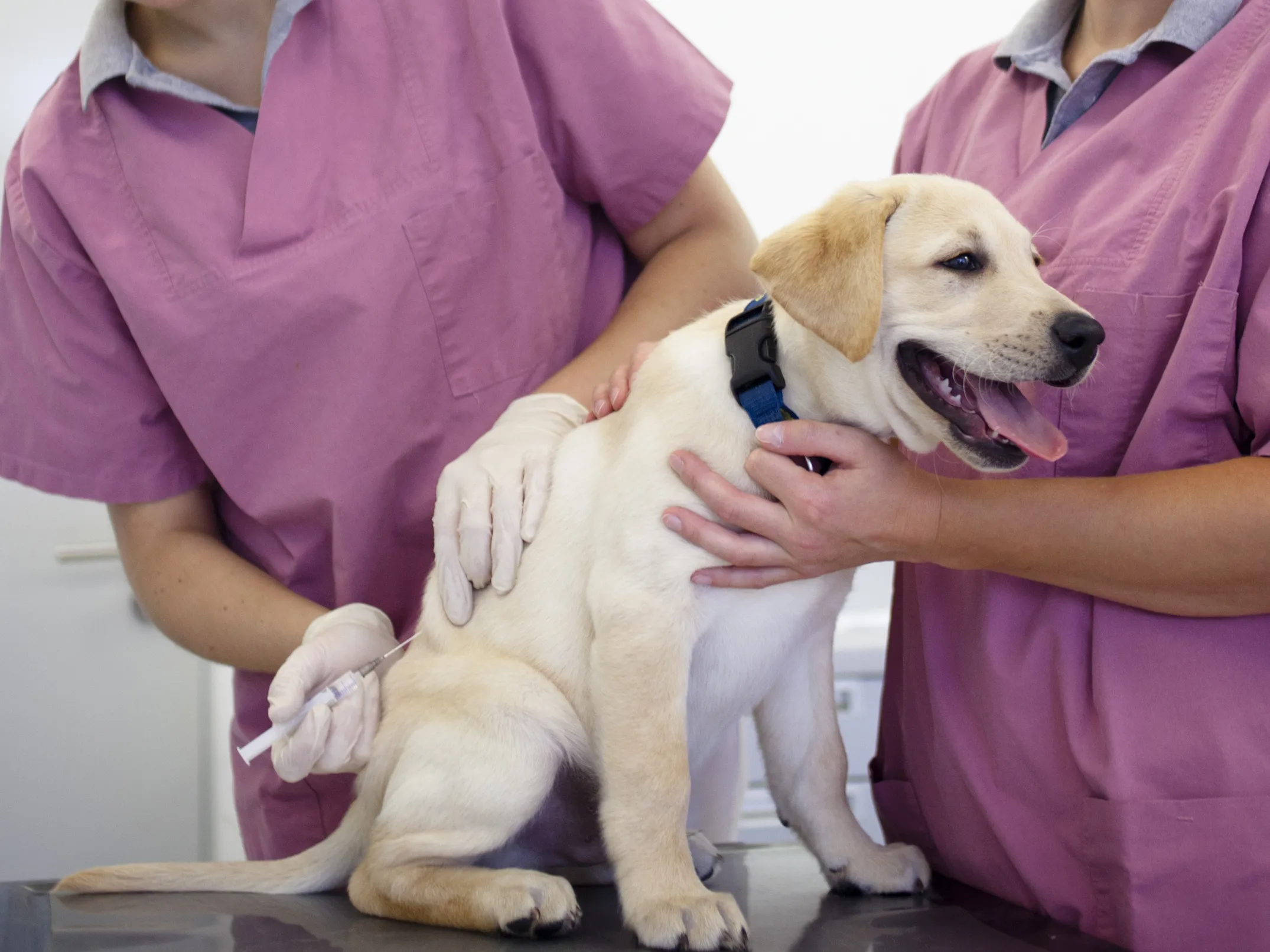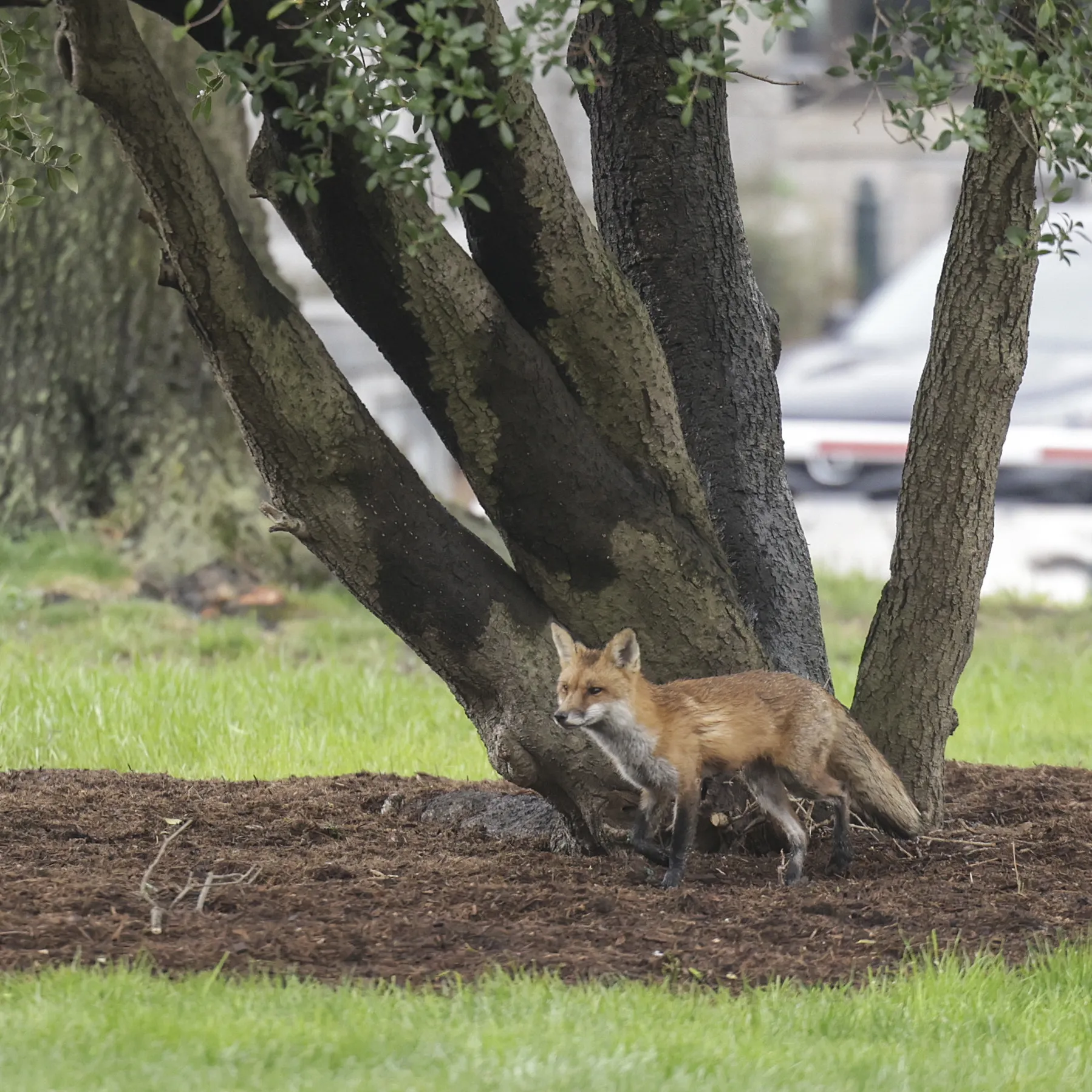The rabies vaccine is a crucial component of responsible dog ownership, mandated in most areas to protect both pets and people from this deadly disease. However, some dog owners express concerns about potential side effects after their dog receives the rabies vaccine. This article addresses those concerns by exploring the facts about rabies vaccination, examining the potential side effects, and providing guidance on what to do if your dog experiences an adverse reaction.
 Dog getting a rabies shot, showing a veterinarian administering the vaccine in a clinical setting.
Dog getting a rabies shot, showing a veterinarian administering the vaccine in a clinical setting.
Understanding the Importance of Rabies Vaccination
Rabies is a viral disease that affects the central nervous system. It is almost always fatal once symptoms appear, impacting both animals and humans. The virus is typically transmitted through the saliva of an infected animal, usually via a bite. Vaccination is the most effective way to protect your dog from rabies.
While “canine vaccine hesitancy,” as highlighted in a study from the Boston University School of Public Health, indicates some owners question the vaccine’s safety or necessity, veterinary experts emphasize its critical role in public health. Rabies vaccines have been used for decades and are considered incredibly safe, especially when weighed against the risk of contracting the disease.
Common and Mild Side Effects
Most dogs experience no or only mild side effects after receiving the rabies vaccine. These common reactions are usually temporary and resolve within a few days. They can include:
- Lethargy or Fatigue: Your dog may seem more tired than usual for a day or two.
- Soreness or Swelling at the Injection Site: A small, localized swelling or tenderness may occur where the vaccine was administered.
- Mild Fever: A slight increase in body temperature is possible.
- Decreased Appetite: Your dog might eat less than usual for a short period.
These mild reactions are typically not cause for concern and can be managed at home with rest and observation.
Rare but Serious Adverse Reactions
While rare, serious adverse reactions to the rabies vaccine can occur. It’s important to be aware of these potential risks and seek immediate veterinary attention if your dog exhibits any of the following symptoms:
- Severe Allergic Reaction (Anaphylaxis): This is a life-threatening reaction that can occur within minutes of vaccination. Symptoms include difficulty breathing, facial swelling, hives, vomiting, and collapse.
- Facial Swelling (Angioedema): Swelling around the face, especially the muzzle and eyes, can indicate an allergic reaction.
- Persistent Vomiting or Diarrhea: While mild gastrointestinal upset can occur, persistent or severe vomiting or diarrhea warrants veterinary attention.
- Difficulty Breathing or Coughing: These signs suggest a respiratory issue that needs immediate evaluation.
- Seizures: Although extremely rare, seizures can occur as a reaction to the vaccine.
- Unusual Behavior: Any significant changes in your dog’s behavior, such as aggression, disorientation, or unresponsiveness, should be reported to your veterinarian.
 Close-up of a dog's face with swelling around the muzzle, demonstrating a potential allergic reaction after vaccination.
Close-up of a dog's face with swelling around the muzzle, demonstrating a potential allergic reaction after vaccination.
What to Do If You Suspect an Adverse Reaction
If you suspect your dog is experiencing an adverse reaction to the rabies vaccine:
- Contact Your Veterinarian Immediately: Time is of the essence, especially in cases of anaphylaxis.
- Describe the Symptoms: Provide your veterinarian with a detailed description of the symptoms your dog is exhibiting, including when they started and how severe they are.
- Follow Your Veterinarian’s Instructions: Your veterinarian will advise you on the best course of action, which may include bringing your dog in for an examination and treatment.
- Report the Reaction: Your veterinarian can report the adverse reaction to the vaccine manufacturer and the appropriate regulatory agencies. This helps monitor vaccine safety and identify potential issues.
Minimizing the Risk of Side Effects
While side effects cannot be completely eliminated, there are steps you can take to minimize the risk:
- Discuss Your Concerns with Your Veterinarian: Before vaccinating your dog, discuss any concerns you have about potential side effects. Your veterinarian can assess your dog’s individual risk factors and recommend the most appropriate vaccination protocol.
- Ensure Your Dog is Healthy: Vaccinate your dog only when they are healthy. If your dog is sick or has a pre-existing medical condition, delay vaccination until they are stable.
- Consider Pre-Treatment: In some cases, your veterinarian may recommend pre-treating your dog with an antihistamine to reduce the risk of an allergic reaction, especially if your dog has a history of vaccine reactions.
- Monitor Your Dog After Vaccination: Observe your dog closely for any signs of an adverse reaction in the hours and days following vaccination.
- Avoid Over-Vaccination: Follow your veterinarian’s recommended vaccination schedule and avoid unnecessary booster shots.
The Importance of Vaccination Outweighs the Risks
It’s essential to remember that the benefits of rabies vaccination far outweigh the risks of potential side effects. Rabies is a deadly disease, and vaccination is the most effective way to protect your dog and your community. According to the CDC, rabies vaccinations prevent nearly 300 dogs from getting infected each year.
Hesitancy towards the rabies vaccine can have serious consequences. If a dog isn’t vaccinated and bites someone, animal control may euthanize the dog for testing, as human health supersedes animal health in such cases.
Conclusion
While some dog owners may be concerned about potential side effects after the rabies vaccine, it’s important to remember that these reactions are generally mild and temporary. Serious adverse reactions are rare. By understanding the risks and benefits of vaccination, working closely with your veterinarian, and monitoring your dog after vaccination, you can ensure that your pet receives the protection they need while minimizing the risk of complications. Remember, the rabies vaccine is a vital tool in protecting both your dog and the community from this deadly disease.
